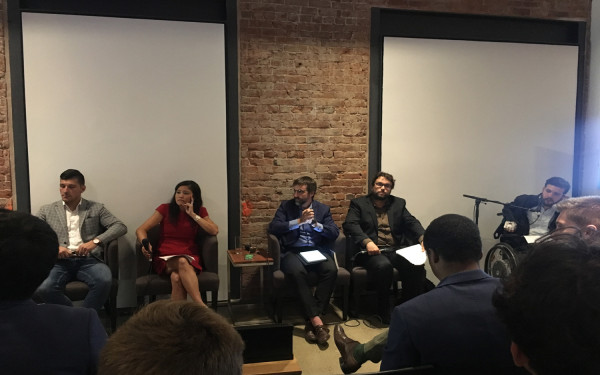Ville-Marie Candidates Debate Environment, Reconciliation
Four Federal Candidates for Ville-Marie—Le Sud-Ouest—Île-des-Sœurs Riding Made Their Case to Students.
A young crowd gathered at McGill University on Oct. 1 for a candidates debate for the Ville-Marie—Le Sud-Ouest—Île-des-Sœurs federal riding.
The candidates fielded questions from students on issues like the environment and Indigenous reconciliation.
The debate, organized by the Student’s Society of McGill University, assembled Liberal Minister Prime Marc Miller, Conservative candidate Michael Forian, New Democratic Party candidate Sophie Thiébaut, and Green Party candidate Liana Canton-Cusmano.
In the shadow of Sept. 27’s historic march, climate was a big topic of discussion and all the candidates addressed it in their opening statements.
“This time four years ago, the question on people’s mind was not the environment,” said Miller, the only candidate from the previous election. “Increasingly, it is so and particularly for your generation.”
He then highlighted his government’s environmental record.
The Conservative candidate echoed his statement.
“The biggest concern I’m hearing when I’m going door to door is the environment,” said Forian in his opening statement.
Thiébaut introduced herself by taking a shot at the Liberals. “I felt indignant when the Liberal government decided to buy the Kinder Morgan pipeline,” said Thiébaut when explaining her reasons to run in this federal election.
The first question was on environmental policies. Thiébaut stated the NDP’s declaration of a climate emergency. She listed potential policies such as investing in public transit and changing building efficiency regulations. She also mentioned ending fossil fuel subsidies and putting the money towards retraining laid off fossil fuel industry workers.
Forian brought up the issue of raw sewage being dumped into rivers, notably the Saint Lawrence river in Montreal.
The Conservative candidate said they would ban the practice. Miller responded by stating the issue dates from before the Trudeau Government. He added that they plan to increase funding for municipal infrastructure.
He also said that the dumping is done in a controlled fashion, and banning the practice would be worse.
Forian explained the Conservative Party’s plan to invest in green technology. He called for scrapping the carbon tax, claiming it taxes families, not large emitters.
Cusmano agreed with Forian on the issue of wastewater. They also highlighted the need for solutions to local environmental issues, such as air pollution from Highway 720 in Saint-Henri.
Miller recapped policies the Liberal government has already put in place. These include the $2 billion Low Carbon Economy Fund which is being used to reduce McGill’s carbon footprint. He also defended his approval of the Kinder Morgan pipeline. He defended the pipeline as safer than rail and claimed all profits would go towards green initiatives.
In the same vein, the candidates were asked if they support animal agriculture subsidies. Forian answered affirming the Conservative’s support of the supply management system.
Miller also supports the animal agriculture industry, emphasizing the ethical standards that apply to them.
Cusmano highlighted the negative externalities of industrial agriculture. They presented their party’s plan to introduce animal welfare legislation and end factory farming.
Thiébaut said she does not eat meat.
On reproductive rights, there was no debate. All candidates affirmed themselves as pro-choice.
Candidates were then asked about reconciliation with First Nations.
Cusmano highlighted the issue of Indigenous homelessness. They said Indigenous people have been systematically failed, critiquing Miller for not doing enough for his Indigenous constituents.
Miller, the Parliamentary Secretary to the Minister of Crown–Indigenous Relations, defended his record, emphasizing that it’s a long and complex issue. He acknowledged the government’s failure to properly address it.
Thiébaut called for recognition of Indigenous rights and knowledge. She specifically addressed the issue of potable water on reserves, saying the NDP would fix it by 2021.
“I think it’s unacceptable that the residents of Grassy Narrow First Nations have been exposed to harmful mercury contamination for decades,” said Forian, blaming the Liberal government.
Following reconciliation, they were asked about the National Inquiry into Missing and Murdered Indigenous Women and Girls. Forian said he supported the inquiry but was disappointed in the Liberal’s handling of it. Miller defended their record, stating they made the largest investment in Indigenous people in Canadian history.
“The most important thing is that the First Nations, the Inuit, and the Métis have a seat at the table,” said Cusmano. They marked the need for solutions from the communities, not a colonial power.
Open question period had the candidates defending their leaders. “Andrew [Scheer]’s proud to have eight openly gay candidates running with him across Canada, I’m very proud to be one of them,” said Forian when asked how he can come to terms with Sheer’s historical opposition to LGBTQ+ communities.
“I was there,” said Miller about Trudeau’s blackface at Collège Jean-de-Brébeuf. “I was sixteen years old, if anything I was guilty of silence, which I think a lot of us are.”
He explained his decision to join the Liberal’s Black caucus and the learning opportunities it has brought him. “It is really their voices people need to hear and that is one of the lessons I learned,” he said. “It wasn’t my turn to speak, but more to listen.”
A previous version of this article misgendered Green Party candidate Liana Canton-Cusmano. The Link regrets this error.

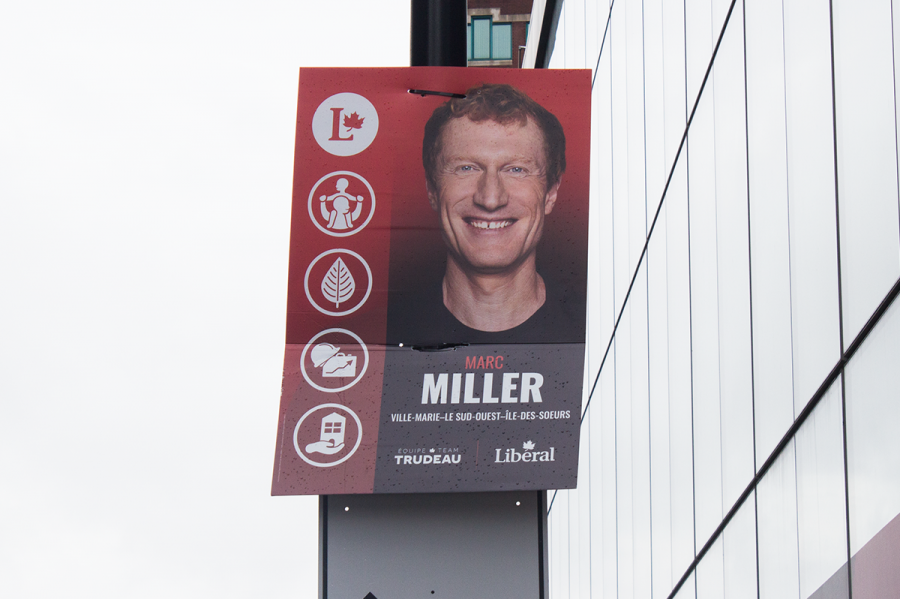
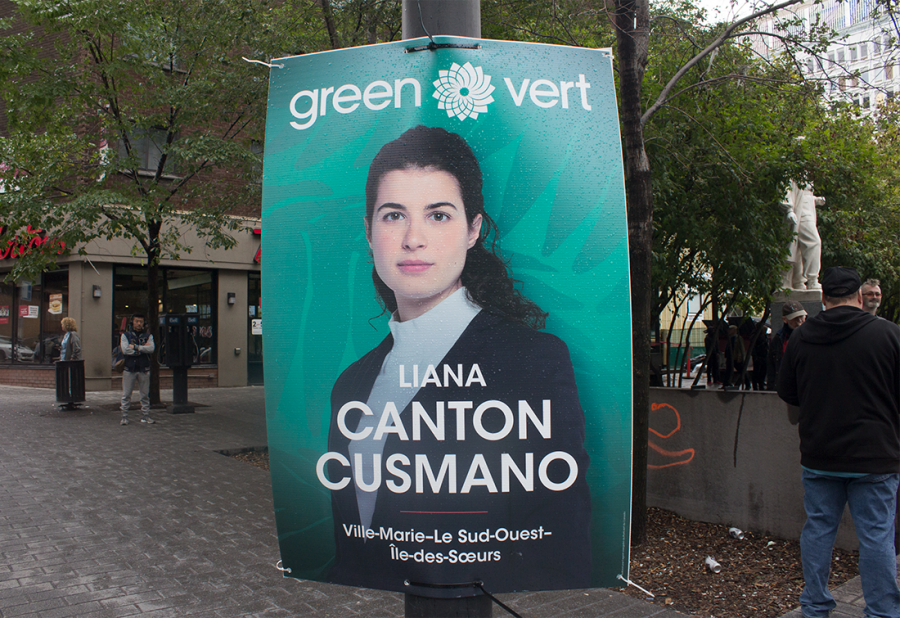
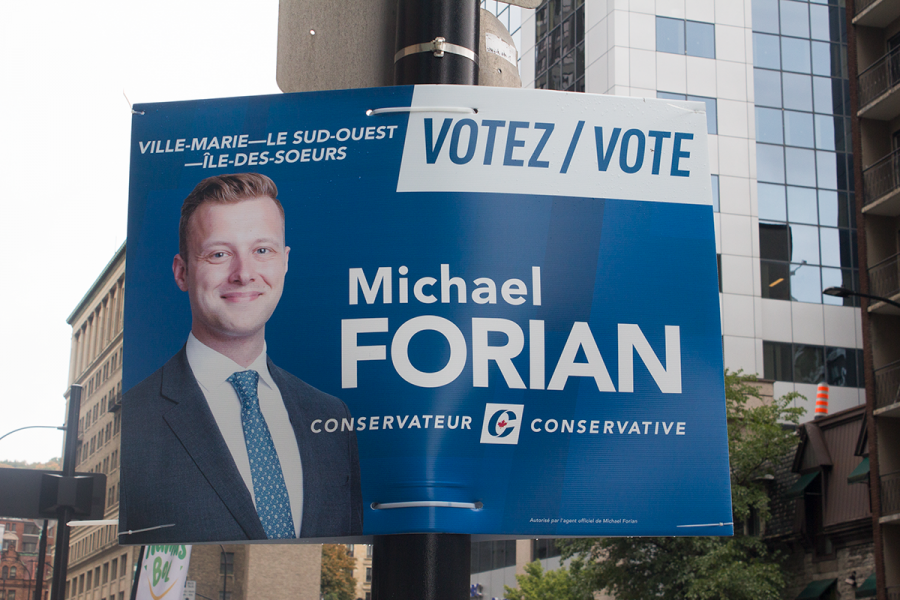



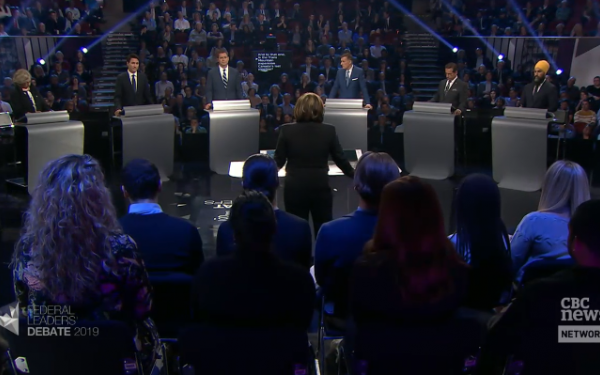

Mulcair_600_375_90_s_c1.jpg)
